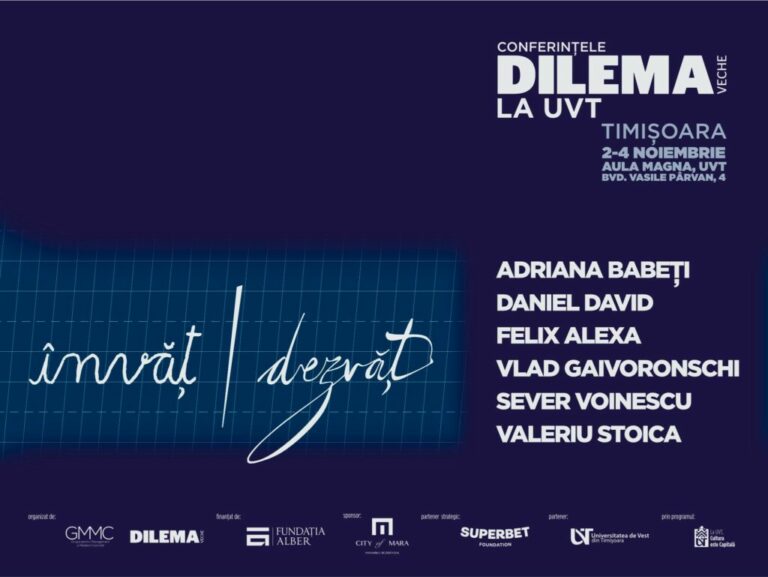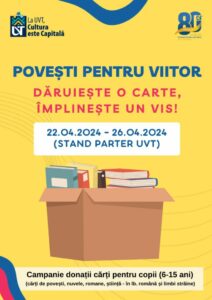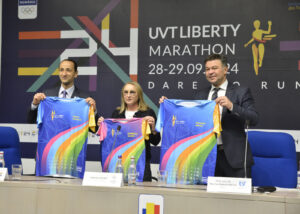Between November 2 and 4, 2022, from Wednesday to Friday, the Old Dilemma Conferences arrive in Timișoara for the second time. It's an edition where the invited lecturers will address a very current theme: "Learning and unlearning". The welcoming host of the events will be the West University of Timișoara. The conferences will take place, two on each day of the program, starting at 18.00. The entry is free.
In the order of presentations and public dialogues, the lecturers of the Timisoara edition are: the writer Adriana Babeți, the psychologist Daniel David, the director Felix Alexa, the architect Vlad Gaivoronschi, the journalist Sever Voinescu and the law professor Valeriu Stoica.
Sever Voinescu, editor-in-chief Old Dilemma: "We live in a time when we all strongly believe that education is essential, that everything we live, bad or good, is the product of our education and that solving our big problems depends on education. We rush at education - be it institutionalized or not - with all the energy generated by our immense frustrations that often take on the intensity of neurosis. Continually dissatisfied, we rarely stop from reforming education only to find that it is not good and start reforming again. An old and wise saying, however, says that whatever you learn, you also unlearn. What can this mean? That any progress achieved in education requires the elimination of a "ballast" from past education? Or that no learning is safe, is not irreversible, being always threatened by unlearning? If so, who has the duty to teach you and who has the duty to unlearn - aren't learning and unlearning two different experiences of life, even if the proverb puts them together? Do educators also think about what they teach their students? What about the parents? And, after all, as the cliché goes in our media, who loses and who gains from learning/unlearning?
We will reflect on these questions in a series of conferences under the brand and, above all, in the "Old Dilemma" style. Competent people, from different perspectives, try above all to correctly formulate the dilemma and guide the thinking of the answer."
_______________________________________________________
Program of the Old Dilemma Conferences at UVT:
Wednesday, November 2, 18.00 p.m
Adriana Babeti
"The seduction. New didactics?"
Comenius, considered the father of modern pedagogy, was the first to speak about didactica nova, being convinced that the method is essential to a good pedagogy. From him onwards, teaching was continuously renewed, at an increasingly accelerated pace. Today, we want an education that aims more and more at the affective capture of the student, thus pretending that pedagogy resembles a seduction operation. In the game - because seduction is a kind of game - comes not only the teacher's personality, not only his talent, but also the subject taught. Literature has always been an essential subject in the educational process and, perhaps, the most suitable of the fundamental disciplines for seduction. What can be seductive in literature, but how legitimate is it to make literature a veritable art of seduction? And most importantly: what benefit does it bring to the student to be seduced by literature?
Wednesday, November 2, 19.20 p.m
Daniel David
"The new education within the Revolution 4.0+"
The evolution of human civilization has gone through several industrial revolutions, passing through mechanization (1.0), electrification, (2.0), digitization (3.0) and connectivity (4.0). We will analyze education models within the 4.0 revolution and beyond, with implications for formal, non-formal and informal education.
Thursday, November 3, 18.00 p.m
Felix Alexa
"Theatre - a job that "steals" or that "steals you"?"
They say that artistic professions cannot be learned, but are "stolen" from the masters. The theater, especially. Is theatrical art passed down from one generation to another, or does each generation discover its own individuality, reinventing the art each time? On the other hand, in today's world, the ability of theater to educate and form is recognized and cultivated. Are the actor and the director obliged to think (also) about the pedagogical effect of their art? How does one learn an art that is increasingly pushed to teach, in turn, others?
Thursday, November 3, 19.20 p.m
Vlad Gaivoronschi
"Built environment / architectural landscape, certainties and dilemmas"
The built environment that we define as an architectural landscape, beyond its protective function, has a formative character, a fact discovered by anthropologists, philosophers, tried by dictators, ideologues of consumption, etc. There is an organic relationship between the way we feel our own corporeality and the way we assimilate and understand the nearby landscape. We experience the architectural landscape and it influences us on three intertwined levels: as a silhouette, becoming memorable through strong forms (the typological layer), as an atmosphere that embraces us that we absorb with all our senses and identify with it (the morphological layer) and as a spatial universe which becomes our scene of life in which we move, orient ourselves and perceive the entire landscape in a dynamic way.
The architectural landscape is a telling mirror of our aspirations and failures, ultimately reflecting our respect for ourselves.
Friday, November 4, 18.00 p.m
Sever Voinescu
"What cannot be learned anywhere"
We always start from the idea that people are the product of their education; that everything they do, good or bad, they learned from somewhere. Is it really so? It is difficult to say how many educational reforms have taken place in Romania in the last 30 years. But did you think that this nonsense might not necessarily be attributable to our politicians? Perhaps the entire free world has reached a point where it doesn't quite know how to shape its future. Perhaps the current age of the Euro-Atlantic civilization presupposes a veritable crisis of education. Maybe the future is slipping out of our hands just now, when we think we can manage it better.
Friday, November 4, 19.20 p.m
Valeriu Stoica
"Legal pedagogy between learning and unlearning"
The order of the city, its political and civic composition, institutional structure, freedom, safety and prosperity depend to a large extent on the citizens and legal professionals. A community cannot be organized according to the values and principles of constitutional democracy and capitalism without good citizens and without a strong, honest and competent category of legal professionals. In such a community, not only legal education is needed, but also legal pedagogy. The garment of the culture of freedom is the legal culture. How much learning and how much unlearning is needed for the vitality and efficiency of the legal culture of freedom?
_____________________________________
The Dilema veche conferences are a project initiated by the Group for Cultural Management and Mediation (GMMC) and organized together with the magazine Dilema veche.
Funder: Alber Foundation
Sponsor: City of Mara
Strategic partner: Superbet Foundation
Partner: Western University of Timișoara through the program "At UVT, Culture is the Capital!"





